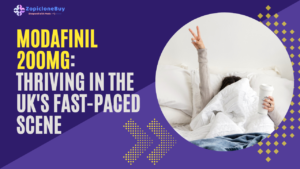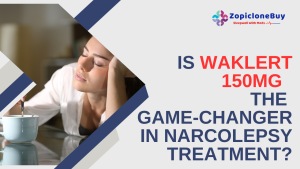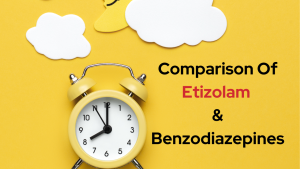Insomnia, the sleep disorder, seems to be affecting nearly 35% of adults of UK population, an unusually large number of people that are facing difficulties sleeping in the night, which is otherwise a regular and basic human activity. Sleep is a very relaxing process and helps rejuvenate and heal one’s body. Sleeplessness, however leads to a host of complications in the body causing- stress, anxiety and in severe cases, depression.
Insomnia could be caused due to a plethora of reasons in today’s lifestyle patterns. Often times, there may not be one specific cause or reason leading to sleeplessness, rather due to multiple underlying factors acting together resulting in disturbed sleep (sleep maintenance) or difficulty falling asleep (sleep onset). However, the most common causes for Insomnia include- excess stress, irregular sleep schedules, current lifestyle habits, alcohol, caffeine, etc.
OVER-THE-TOP SLEEPING PILLS
If you are facing difficulty with falling asleep or have a disturbed sleep pattern, at the early stages some Insomnia medicines can help battle the sleep issues. Many OTC sleeping pills are available that are mild and cause sleepiness as a side effect rather than as the main function. Such pills maybe effective at low dependency rates.
FIRST-GEN ANTIHISTAMINES
People who have problems falling or staying asleep may benefit from sedating antihistamines. Some over-the-counter antihistamines, which are commonly used to treat allergies, might make you sleepy. This isn’t true with all antihistamines. Only Sedating antihistamines, sometimes known as first-generation antihistamines, are used by certain people to encourage sleep or ease tension and anxiety.
Antihistamines that cause sedation include:
Benadryl’s active ingredient is diphenhydramine
Unisom’s active component is doxylamine
Marezine’s active ingredient is cyclizine
These antihistamines can easily pass the blood-brain barrier and bind to H1 receptors in the brain (CNS). The CNS’s H1receptors aid in the regulation of the body’s sleep-wake cycle. First-generation antihistamines can impair cognitive and motor functioning as well as cause sleepiness by binding to CNS receptors.
Daytime drowsiness, dry mouth, impaired vision, constipation, and urine retention are all possible side effects of using these sedatives.
MELATONIN
Melatonin is a hormone that aids in the regulation of your natural sleep-wake cycle. When it is light outside, the brain produces less melatonin, and when it is dark, such as during the winter, the brain produces more. Age has a role as well; as people get older, they produce less melatonin.
Melatonin is also a supplement that can be purchased over the counter as sleeping aids. If you’re having difficulties sleeping because your circadian cycle is off, this medication will be the most effective. Melatonin supplements may be useful in alleviating jet lag or lowering the time it takes to fall asleep, according to some study, however the effect is usually mild.
When using melatonin, it’s critical to follow the directions carefully. It’s not a good idea to take it right before bedtime, because melatonin has a delayed effect. It takes many hours for its effects to kick in.
VALERIAN ROOT SUPPLEMENTS
Supplements from this plant are sometimes used as sleep aids. Valerian root is a popular valerian plant component. Valerian is found in many herbal supplements to help with sleep, anxiety, and relaxation. Several clinical investigations have shown that valerian can help persons with insomnia sleep better.
Pregnant women and children under the age of three should avoid valerian because the medical community is still unsure of the consequences. Taking Valerian supplements may have certain side effects such as headaches, dizziness, itching, and gastrointestinal issues. After consuming valerian root, some people report feeling foggy or drowsy in the morning. Valerian root-based sleep aids can be found at pharmacies, health food stores, and online.
On the flip side however, Antihistamines are found in most over-the-counter sleep aids. Consuming antihistamines can lead to acquiring tolerance to their sedative effects quickly, so the longer you take them, the less likely they are to make you sleepy.
Furthermore, certain over-the-counter sleep aids can leave you sluggish and sick the next day.
PRESCRIPTION MEDICINES
In the occasion of severe Insomnia, it is advised to visit your doctor for prescription medicines. Prescription sleeping drugs may make it simpler to fall asleep or stay asleep for extended periods of time. Different prescribed sleeping drugs have different risks and advantages. Your doctor should, in general, perform the following to discover the proper prescription drug to assist you sleep:
To rule out any underlying disorders that could be causing sleep issues, tests should be conducted.
Discuss prescription sleeping medication choices, including how frequently and when to take it, as well as what form to take it in, such as pills, oral spray, or dissolving tablets.
Prescribe a sleeping pill for a short period of time to discover what benefits and drawbacks you might encounter.
Some of the commonly prescribed sleeping pills include:
BENZODIAZEPINES
Benzodiazepines, or BZD for short, are a class of psychoactive medications. Sedative effects of benzodiazepines might help a person relax and fall asleep. They work by reducing brain activity and amplifying the effects of gamma-aminobutyric acid (GABA). GABA is a neurotransmitter that aids in relaxation of the mind and body. The US Food and Drug Administration (FDA) has licenced five BZDs for treating insomnia, including those with short, moderate, and long-acting effects. BZDs, on the other hand, are typically not suggested for long-term insomnia treatment due to the substantial risk of abuse and dependence.
Examples include:
Halcion (Triazolam)
Restoril (Temazepam)
Doral (Quazepam)
Dalmane (Flurazepam)
ProSom (Estazolam)
NON-BENZODIAZEPENES or Z-DRUGS
This class of medications, sometimes known as Z drugs, was developed to provide the same relief as BZDs but lowering the negative effects and potential for abuse. Z medicines, on the other hand, require a prescription and are classed as Schedule IV controlled substances by the DEA. These sedatives are used to treat insomnia by slowing down brain activity. These drugs are considered first-line treatments for people who have trouble falling asleep or staying asleep.
Some examples include:
Ambien (Zolpidem) – This frequently recommended medication boosts GABA levels. It lessens the time it takes to fall asleep by five to twelve minutes on average. It also adds 29 minutes to your total sleep time. Ambien is not a benzodiazepine, although it has a molecular structure that is similar to one. Because this medicine is processed faster than benzodiazepines, it is less likely to trigger withdrawal symptoms when you stop using it. Ambien may have unpleasant side effects. It’s possible that it’s linked to short term memory loss. It could also lead to sleep-related behaviors such as sleep walking.
Lunesta (eszopiclone) – This medicine, like Ambien, boosts GABA levels. It lowers the time it takes to fall asleep by 14 minutes on average. It extends the overall amount of time spent sleeping by 28 minutes to 57 minutes. The adverse effect of Lunesta is unique. It can leave your mouth with a metallic or coppery flavour.
Sonata (zaleplon) – This medication decreases the time it takes to fall asleep by ten minutes on average. Unfortunately, it is rapidly digested and can wear off in as little as four hours. This might make it useful for consumption when you have disturbed sleep cycles in the night.
OREXIN RECEPTOR ANTAGONIST
Orexins are neurotransmitters that govern and control sensations of wakefulness and sleepiness in the body. This class of drugs are thought to operate by inhibiting the effects of orexin, a molecule involved in wakefulness. It may be given for people who are having trouble falling asleep or staying asleep.
Belsomra (suvorexant) – It cuts the time it takes to fall asleep by eight minutes on average. It also cuts the amount of time people spend awake at night by 16 to 28 minutes.
IMPACTS OF SLEEPING PILLS ON YOUR HEALTH
SIDE EFFECTS
The day after taking sleep medications, about eight out of ten persons have a hangover. They feel tired, their thoughts are jumbled, and they have dizziness or balance issues. These effects can impair your ability to drive, work, go to school, and do normal duties during the day.
These are some of the possible negative effects of over-the-counter and prescription sleeping medications (and supplements):
Diarrhea or constipation.
Dry mouth
Headaches
Gas, heartburn, and nausea
RISK OF DEPENDENCY OR ADDICTION
Sleeping pills are potent medications that should only be taken in limited dosages and for a short period of time to treat insomnia and other sleep disorders. After 10-28 days, a patient’s requirement for a prescription sleep medication should be re-evaluated. According to the Journal of the American Medical Association, more than 68 percent of patients who are prescribed sleeping drugs use them for longer than recommended.
Because these controlled substances are habit developing and you’ll become addicted to sleeping medicines. There’s also the risk of getting mentally reliant or dependant on a drug to help you relax and sleep.
All said and done, sleeping pills alone does not ‘cure’ the illness. Sleep disorders need to be addressed by getting to its bottom, conducting various tests to find out the causes. There are drug-free, long-term therapeutic options available for people who suffer from chronic sleep deprivation. If you’re having difficulties falling asleep or getting enough rest during the night, talk to your doctor about a clinical sleep evaluation. Do not allow yourself to be deprived of sleep on a regular basis.





